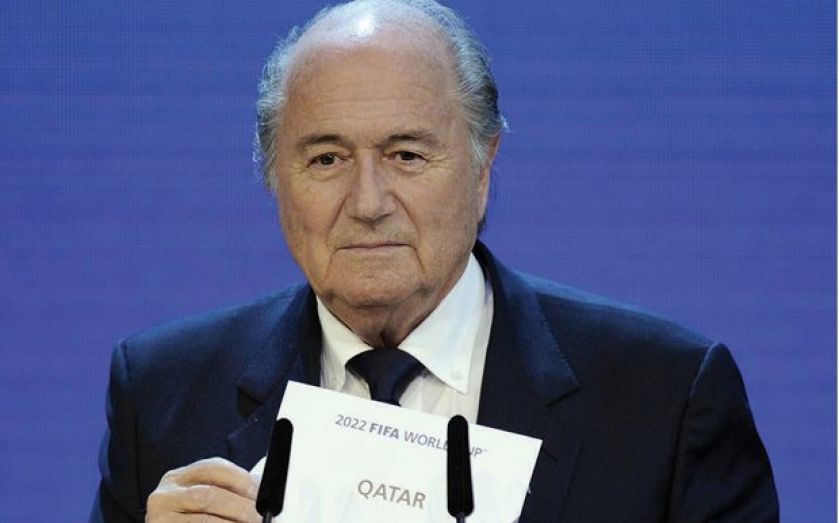Fifa accused of whitewash over bid probe farce

FIFA faced a barrage of whitewashing accusations last night after the lawyer hired to investigate World Cup corruption claimed football’s world governing body had misrepresented his findings.
Michael Garcia, Fifa’s chief ethics investigator, said a report published yesterday that found no cause to re-run the bidding process for the 2018 and 2022 World Cups, won by Russia and Qatar, contained “numerous materially incomplete and erroneous representations of the facts and conclusions” of his 18-month inquiry.
American former district attorney Garcia vowed to appeal the interpretation of his findings by Fifa’s chief ethics adjudicator, Hans-Joachim Eckert. German judge Eckert concluded that “certain occurrences were suited to impair the integrity” of the bidding processes for the two tournaments, but were “of very limited scope” and the effects were “far from reaching any threshold that would require returning to the bidding process, let alone reopening it”.
Eckert’s report highlighted concerns over Qatar’s winning bid – a £1m payment to the Confederation of African Football; the conduct of unofficial bid consultants; and Mohamed Bin Hammam, the Qatari former Fifa executive committee member now banned from football – but explicitly rejected calls for a re-run of the 2010 vote.
Scrutiny of Russia’s bid was limited by the absence of computer or email records. Eckert noted “the evidence available is not sufficient to support findings of misconduct”.
England’s 2018 bid was criticised for “damaging the image of Fifa and the bidding process” by showing a will to satisfy corrupt demands from Jack Warner, the influential former chief of Caribbean and North and Central American football.
Football Association chairman Greg Dyke said his organisation had “nothing to hide” and joined renewed calls for Garcia’s entire report, which names those suspected of wrongdoing, to be made public.
“If the person who did the investigation said the report didn’t reflect what he believed then I’m a bit shocked by it all, as I’m sure most people are,” he said. “Those who co-operated most seemed to be the ones that gave them the information by which they were then criticised, like the FA. Others, who didn’t co-operate, didn’t get criticised at all. Well, there’s a surprise.”
The man who led England’s 2018 bid team, Simon Johnson, called yesterday’s row “farcical”. He added: “Now that I’ve seen Garcia’s statement, I’m absolutely convinced that the report is a politically motivated whitewash.”
Britain’s Fifa vice-president Jim Boyce urged the organisation to publish more details. He said: “I have always said as much of the report as it is legally possible to publish should be made public.”
Conservative MP Damian Collins also called Eckert’s report a whitewash, while shadow sports minister Clive Efford said Fifa had “no choice” but to publish Garcia’s full findings.
Qatar 2022 general secretary Hassan Al Thawadi said they had always been “transparent” and “confident of the integrity of our bid”.
A WHITEWASH? THE REPORT’S FINDINGS
Qatar paid £1.1m to African chiefs for exclusive marketing rights at their conference, but did not break rules. Two unofficial consultants accused of questionable conduct but deemed unaccountable due to informal role.
Fifa member Mohamed Bin Hammam (right) accused of suspect payments to African officials and Jack Warner but no evidence they were to influence Qatari vote.
One Bin Hammam payment, to Oceania official Reynald Temarii “influenced the voting process” in Qatar’s favour, but only by one vote so therefore “did not affect the bid process as a whole”.
Individuals accused of “serious violations” of bidding rules in relation to England bid in Garcia’s (right) report not named by Eckert.
Lack of evidence regarding Russia’s bid noted. Explanation given was that Russia leased computers which were then returned and destroyed, while emails sent from Gmail accounts were not retrieved because Google did not respond to Garcia’s team’s requests.
No mention whatsoever of the joint bid from Spain and Portugal for 2018, which was the subject of widespread claims that it was involved in a vote-swapping pact with Qatar. Eckert’s report did not name them but noted “one specific bid team was particularly uncooperative in responding to the investigatory chamber’s requests”.
